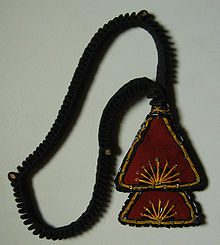Old Orthodox Pomoran Church
The Pomorian Old-Orthodox Church ( Russian Древлеправославная Поморская Церковь / ДПЦ ) is an Orthodox religious community of priest-less Old Believers (Pomorzy or Danilowzy) by the liturgical reforms of Patriarch Nikon in the second half of the 17th century in Russia from a split within the Russian- Orthodox Church emerged.
history
In 1694, the Vygorezkaya Monastery (also Vygovskaya Monastery or Vyg Hermitage) was founded by Daniel Wikulin and the Denisov brothers on the Vyg River (Russian Выг) in Pomorje ( Karelia ), in the north of the European part of Russia From the beginning of the 18th century to the end of the 19th century it was the spiritual center of the Old Believers.
In the Vygorezkaya Monastery the "Pomoric Answers" were written, a compilation of religious questions and their answers by the elders of the Pomorzy, which served as the basis of the Pomoric religious doctrine. The communities of the Pomorzy made a significant contribution to the settlement of the northern regions of Russia and became important economic centers of the Russian north at the beginning of the 19th century. The monks copied old manuscripts, wrote religious works, painted icons and trained choristers. In winter, when the White Sea was frozen, the Old Believers hunted on the ice and came as far as Spitzbergen and Novaya Zemlya . In 1855 they were expelled by Tsar Alexander II .
The ecclesiastical organization of the Pomorzy was created after the publication of the so-called Edict of Tolerance by Tsar Nicholas II on April 17, 1905 on the consolidation of the foundations of freedom of belief . The first Pomorzy Church was consecrated in Moscow on May 10, 1909 .
After the revolution of 1917 , part of the Pomorjan community established communities and religious centers abroad.
theology
Originally, the Pomorjans refused marriage and prayer for the tsar . It was only after 1739, under pressure from the authorities, that they accepted the prayer for the Tsar. This led to the split of the Filippowzy , who did not acknowledge the prayer, and the Fedosejewzy , who refused to marry and led an ascetic, monastery-like life. Like many other religious communities without priesthood, the Old Orthodox Pomoran Church does not have a hierarchical priesthood. The spiritual teachers were responsible for holding divine services and administering the sacraments. In the early 1830s, the Pomorzy split into the Nowopomorzy , who accepted marriage, and the Staropomorzy , who refused to marry.
organization
The Old Orthodox Pomoran Church has congregations in Russia, Lithuania , Latvia , Estonia , Poland , Belarus and Ukraine (in these countries there are governing bodies such as national councils and spiritual commissions), as well as in the USA , Brazil and other countries. In 2001 there were 59 officially registered Pomorzy parishes in Lithuania with 27,000 members.
- Council of the Old Orthodox Pomoran Church in Russia: Российский совет ДПЦ (РС ДПЦ)
- Chairman: Vladimir Viktorovich Shamarin
- Council of the Old Orthodox Pomoran Church in Belarus
- Chairman: Pyotr Alexandrovich Orlov
- Council of the Old Orthodox Pomoran Church in Lithuania
- Chairman: Nikolai Pilnikov
- Council of the Old Orthodox Pomoran Church in Latvia
- Chairman: Alexy Karatajew
- Main Council of the Old Orthodox Pomoran Church in the Republic of Poland
- Chairman: Mieczysław Kapłanow
Web links
- Old Believers today (Russian)
- Website of the Pomorzy Parish Saint Petersburg (Russian)
- Староверы в Рыбацком (Journal) (Russian)
- Hierarchy of the Old Orthodox Pomoran Church (Russian)
Individual evidence
- ↑ Grigorijus Potašenko: The Culture of Old Believers of Baltic States ( Memento of March 4, 2012 in the Internet Archive ), Lithuanian Art Museum, information about the Old Believers in Lithuania (mostly Pomorjanians) (English)
